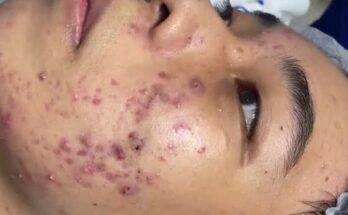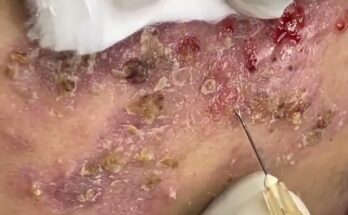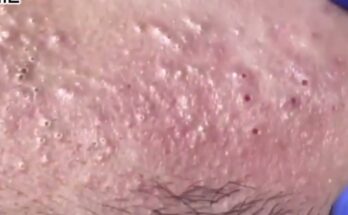FULL VIDEO 👇👇
If you’re looking for a cost-effective and natural approach to treating acne, you can create your own remedies at home. These treatments use commonly available ingredients that are gentle on the skin and help reduce inflammation, kill acne-causing bacteria, and prevent future breakouts.
1. Honey and Cinnamon Spot Treatment
Why It Works
- Honey: Has antibacterial properties and helps moisturize the skin.
- Cinnamon: Contains antimicrobial compounds that fight acne-causing bacteria.
Ingredients
- 1 tablespoon raw honey
- ½ teaspoon cinnamon powder
How to Use
- Mix the honey and cinnamon to form a paste.
- Apply the paste to affected areas.
- Leave it on for 10–15 minutes.
- Rinse with warm water and pat dry.
2. Tea Tree Oil Toner
Why It Works
- Tea tree oil is a natural antiseptic that kills bacteria and soothes inflammation.
Ingredients
- 1 cup distilled water
- 10 drops tea tree essential oil
How to Use
- Mix the tea tree oil with the distilled water in a spray bottle.
- Shake well before each use.
- Spray lightly onto clean skin or apply with a cotton pad.
- Do not rinse off. Use daily.
3. Aloe Vera Gel Mask
Why It Works
- Aloe vera reduces redness and inflammation and provides hydration to soothe irritated skin.
Ingredients
- Fresh aloe vera gel (from a leaf or store-bought, pure aloe vera)
How to Use
- Extract the gel from an aloe vera leaf.
- Apply it directly to clean skin.
- Leave it on for 20 minutes or overnight.
- Rinse with lukewarm water.
4. Apple Cider Vinegar Toner
Why It Works
- Apple cider vinegar balances the skin’s pH and helps exfoliate dead skin cells, preventing clogged pores.
Ingredients
- 1 part apple cider vinegar
- 2 parts water
How to Use
- Mix apple cider vinegar and water in a clean container.
- Apply to the skin with a cotton pad after cleansing.
- Leave it on for a few minutes, then rinse off if your skin is sensitive.
Note: Always do a patch test first as apple cider vinegar can be irritating to sensitive skin.
5. Oatmeal and Yogurt Mask
Why It Works
- Oatmeal: Calms the skin and absorbs excess oil.
- Yogurt: Contains lactic acid, which gently exfoliates and brightens skin.
Ingredients
- 2 tablespoons ground oatmeal
- 1 tablespoon plain yogurt
How to Use
- Mix the oatmeal and yogurt into a paste.
- Apply to your face as a mask.
- Leave it on for 15–20 minutes.
- Rinse with cool water.
6. Green Tea Ice Cubes
Why It Works
- Green tea reduces inflammation and redness and is packed with antioxidants that promote skin healing.
Ingredients
- 1 cup brewed green tea
How to Use
- Brew a cup of green tea and let it cool.
- Pour into an ice tray and freeze.
- Rub the green tea ice cubes gently over inflamed or acne-prone areas.
7. Turmeric and Milk Paste
Why It Works
- Turmeric: Has anti-inflammatory and antibacterial properties.
- Milk: Contains lactic acid that gently exfoliates and softens skin.
Ingredients
- 1 teaspoon turmeric powder
- 2 tablespoons milk
How to Use
- Mix turmeric with milk to create a paste.
- Apply to acne-affected areas.
- Leave it on for 10 minutes.
- Rinse thoroughly to avoid staining.
Tips for Success
- Patch Test First: Always test a small area of skin to ensure you don’t have an allergic reaction.
- Be Consistent: Natural remedies take time; use them regularly for best results.
- Keep It Clean: Cleanse your face twice daily to remove oil, dirt, and bacteria.
- Stay Hydrated: Drink plenty of water to maintain skin hydration.
- Avoid Touching Your Face: This prevents the transfer of bacteria to your skin.
When to See a Dermatologist
DIY treatments are great for mild acne, but if you have severe or persistent breakouts, consult a dermatologist for tailored advice and professional treatments.
With these DIY acne treatments, you can take control of your skincare with natural, effective, and safe solutions!


